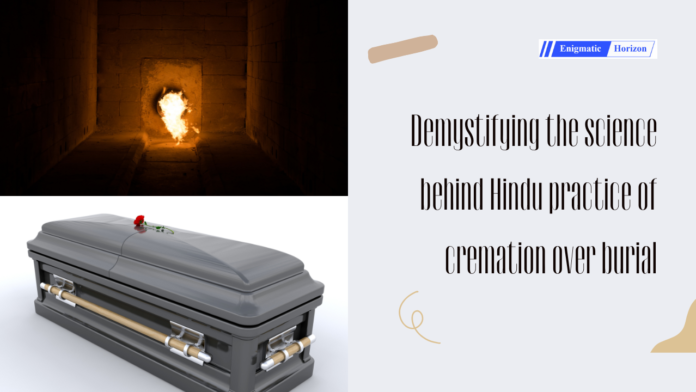Enigmatic Horizon Staff
Hindus believe that cremation is one of the sixteen Solah Samskaras, which are important parts of life. Samskaras in Hinduism are sacraments that begin with one’s birth and then pass through various stages of life to the final rites associated with cremation. But have we ever pondered if there is a science behind the Hindu custom of burning dead bodies rather than burying them? During the Vedic era, people not only cremated the dead but also used to bury them. The Rig Veda states that the Vedic people practice anagni dagdha (burial) and agni dagdha (cremation). Over the years, as civilization emerged, cremation was primarily practiced as a funeral tradition for the departed.
The science or logic behind this ritual is that a human being doesn’t always pass by old age; he or she may suffer from any form of disease or face an accident that can lead to their death. Now, if the body is burned after death, the microorganisms in it will also disappear, as no pathogen can survive the temperature of the fire. Thus, burning or cremating a deceased body ensures that you are preventing it from being a source of any widespread disease.
In his book Life Beyond Death, Sri Ramakrishna’s disciple Swami Abhedananda advanced a different theory. Firstly, he states that cremation is the best method from the standpoint of healthy living beings. The decomposition of bodies will give rise to diseases, and as the population grows, there will be limited spaces available for burying the dead bodies.
Another critical reason why the body is buried immediately after death is that once one leaves their body during death, they still have an attachment to their physical body, and they continuously cling to the body. This can also cause problems for the kin of the person who has departed. Cremation gives a signal to the soul that his or her old life has ceased to exist and a new one has begun, and thus they can walk past the journey to higher celestial realms.
In Hinduism, the body is said to be composed of five prime elements: air, water, earth, fire, and ether. The cremation is linked to returning the body to these five elements of nature. The body returns to nature, after which the ashes are collected and poured into a river. The cremation of the deceased person is, therefore, supposed to help the departed soul by freeing them from the attachments to the body they previously resided in. Contrary to this, many of the other religions prefer burial over cremation. They believe burial, as opposed to cremation, seems to be a “sanitized” and “better” way of disposing of the dead bodies.
Hence India, better known as the land of diversity, tradition, and belief, remains deeply rooted to its culture and history. Hindus believe that cremation and the mourning that comes after it help the soul find peace. Many other religions, however, argue that burial is a better practice because the human body, living or dead, is holy and should be treated with honor and respect. So, apparently, knowledge backed by rituals shows that cremation has more merits than demerits, which explains why this practice has been followed in our culture since the Vedic period.
